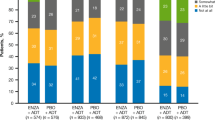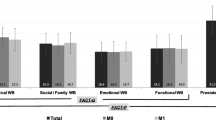Abstract
Purpose
Although fatigue is a common problem for men with prostate cancer undergoing androgen deprivation therapy (ADT), there has been little systematic research on this issue. The present study examined changes in fatigue among prostate cancer patients receiving ADT compared to controls and predictors of heightened fatigue in ADT patients.
Methods
Prostate cancer patients treated with ADT (ADT+ group, n = 60) completed assessments of fatigue prior to or just after ADT initiation (baseline) and 6 and 12 months later. Prostate cancer patients treated with prostatectomy only (ADT− group, n = 85) and men without cancer (CA− group, n = 86) matched on age and education completed assessments at similar intervals.
Results
Group-by-time interactions for fatigue severity, interference, and duration were observed when comparing the ADT+ group to the controls. Groups did not differ at baseline; however, the ADT+ group reported worse fatigue at 6 and 12 months. The same pattern was observed for changes in the prevalence of clinically meaningful fatigue and the extent of clinically meaningful change in fatigue. Within the ADT+ group, higher baseline comorbidity scores were associated with greater increases in fatigue interference, and higher baseline Gleason scores were associated with greater increases in fatigue duration.
Conclusions
Prostate cancer patients receiving ADT demonstrate a trajectory of worsened fatigue during the first 12 months following treatment initiation relative to the controls. Greater comorbidities and higher Gleason scores at baseline appear to be risk factors for heightened fatigue during the first year following ADT initiation. Results highlight important time points for implementation of interventions aimed at fatigue reduction.



Similar content being viewed by others
References
Irani J, Salomon L, Oba R, Bouchard P, Mottet N (2010) Efficacy of venlafaxine, medroxyprogesterone acetate, and cyproterone acetate for the treatment of vasomotor hot flushes in men taking gonadotropin-releasing hormone analogues for prostate cancer: a double-blind, randomized trial. Lancet Oncol 11:147–154. doi:10.1016/S1470-2045(09)70338-9
Smith MR, Finkelstein JS, McGovern FJ et al (2002) Changes in body composition during androgen deprivation therapy for prostate cancer. J Clin Endocrinol Metab 87:599–603
Grossmann M, Zajac JD (2011) Management of side effects of androgen deprivation therapy. Endocrinol Metab Clin North Am 40:655–671. doi:10.1016/j.ecl.2011.05.004
Gonzalez BD, Jim HSL, Donovan KA et al (2015) Course and moderators of hot flash interference during androgen deprivation therapy for prostate cancer: a matched comparison. J Urol 194:690–695. doi:10.1016/j.juro.2015.03.026
Pirl WF, Greer JA, Goode M, Smith MR (2008) Prospective study of depression and fatigue in men with advanced prostate cancer receiving hormone therapy. Psycho-Oncol 17:148–153. doi:10.1002/pon.1206
Cherrier MM, Aubin S, Higano CS (2009) Cognitive and mood changes in men undergoing intermittent combined androgen blockade for nonmetastatic prostate cancer. Psycho-Oncol 18:237–247. doi:10.1002/pon.1401
Stone P, Hardy J, Huddart R, A’Hern R, Richards M (2000) Fatigue in patients with prostate cancer receiving hormone therapy. Eur J Cancer 36:1134–1141. doi:10.1016/S0959-8049(00)00084-8
Storey DJ, McLaren DB, Atkinson MA et al (2012) Clinically relevant fatigue in men with hormone-sensitive prostate cancer on long-term androgen deprivation therapy. Ann Oncol 23:1542–1549. doi:10.1093/annonc/mdr447
Alibhai SMH, Breunis H, Timilshina N et al (2010) Impact of androgen-deprivation therapy on physical function and quality of life in men with nonmetastatic prostate cancer. J Clin Oncol 28:5038–5045. doi:10.1200/JCO.2010.29.8091
Deng N, Guyer R, Ware JE Jr (2015) Energy, fatigue, or both? A bifactor modeling approach to the conceptualization and measurement of vitality. Qual Life Res 24:81–93. doi:10.1007/s11136-014-0839-9
Pfeiffer E (1975) A short portable mental status questionnaire for the assessment of organic brain deficit in elderly patients. J Am Geriatr Soc 23:433–41. doi:10.1111/j.1532-5415.1975.tb00927.x
Katz JN, Chang LC, Sangha O, Fossel AH, Bates DW (1996) Can comorbidity be measured by questionnaire rather than medical record review? Med Care 34:73–84
Hann DM, Jacobsen PB, Azzarello LM et al (1998) Measurement of fatigue in cancer patients: development and validation of the Fatigue Symptom Inventory. Qual Life Res 7:301–310
National Comprehensive Cancer Network: NCCN Clinical practice guidelines in oncology: cancer-related fatigue (version 2.2015). www.nccn.org
Donovan KA, Jacobsen PB (2011) The Fatigue Symptom Inventory: a systematic review of its psychometric properties. Support Care Cancer 19:169–185. doi:10.1007/s00520-010-0989-4
Gonzalez BD, Jim HS, Booth-Jones M et al (2015) Course and predictors of cognitive function in patients with prostate cancer receiving androgen deprivation therapy: a controlled comparison. J Clin Oncol 33:2021–2027. doi:10.1200/JCO.2014.60.1963
Lee M, Jim HS, Fishman M et al (2015) Depressive symptomology in men receiving androgen deprivation therapy for prostate cancer: a controlled comparison. Psycho-Oncol 24:472–477. doi:10.1002/pon.3608
Galvao DA, Taaffe DR, Spry N, Joseph D, Newton RU (2010) Combined resistance and aerobic exercise program reverses muscle loss in men undergoing androgen suppression therapy for prostate cancer without bone metastases: a randomized controlled trial. J Clin Oncol 28:340–347. doi:10.1200/JCO.2009.23.2488
Segal RJ, Reid RD, Courneya KS et al (2009) Randomized controlled trial of resistance or aerobic exercise in men receiving radiation therapy for prostate cancer. J Clin Oncol 27:344–351. doi:10.1200/JCO.2007.15.4963
Segal RJ, Reid RD, Courneya KS et al (2003) Resistance exercise in men receiving androgen deprivation therapy for prostate cancer. J Clin Oncol 21:1653–1659. doi:10.1200/JCO.2003.09.534
Cormie P, Newton RU, Spry N et al (2013) Safety and efficacy of resistance exercise in prostate cancer patients with bone metastases. Prostate Cancer Prostatic Dis 16:328–335. doi:10.1038/pcan.2013.22
Santa Mina D, Alibhai SMH, Matthew AG et al (2013) A randomized trial of aerobic versus resistance exercise in prostate cancer survivors. J Aging Phys Act 21:455–478
Barsevick AM, Dudley W, Beck S et al (2004) A randomized clinical trial of energy conservation for patients with cancer-related fatigue. Cancer 100:1302–1310. doi:10.1002/cncr.20111
Montgomery GH, Kangas M, David D et al (2009) Fatigue during breast cancer radiotherapy: an initial randomized study of cognitive-behavioral therapy plus hypnosis. Health Psychol 28:317–322. doi:10.1037/a0013582
Jacobsen PB, Meade CD, Stein KD et al (2002) Efficacy and costs of two forms of stress management training for cancer patients undergoing chemotherapy. J Clin Oncol 20:2851–2862. doi:10.1200/JCO.2002.08.301
Gong S, Sheng P, Jin H et al (2014) Effect of methylphenidate in patients with cancer-related fatigue: a systematic review and meta-analysis. PLoS One 9, e84391. doi:10.1371/journal.pone.0084391
Paulsen O, Klepstad P, Rosland JH et al (2014) Efficacy of methylprednisolone on pain, fatigue, and appetite loss in patients with advanced cancer using opioids: a randomized, placebo-controlled, double-blind trial. J Clin Oncol 29:3221–3229. doi:10.1200/JCO.2013.54.3926
Acknowledgments
This work was supported by the following grants from the National Cancer Institute: R01 CA132803 (PI: Jacobsen) and R25 CA090314 (PI: Jacobsen). None of the authors have any financial disclosures.
Author information
Authors and Affiliations
Corresponding author
Rights and permissions
About this article
Cite this article
Nelson, A.M., Gonzalez, B.D., Jim, H.S.L. et al. Characteristics and predictors of fatigue among men receiving androgen deprivation therapy for prostate cancer: a controlled comparison. Support Care Cancer 24, 4159–4166 (2016). https://doi.org/10.1007/s00520-016-3241-z
Received:
Accepted:
Published:
Issue Date:
DOI: https://doi.org/10.1007/s00520-016-3241-z




